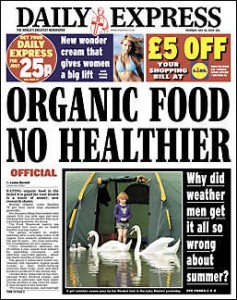Organic data: production, support programs, nutrients, safety, and corporate ownership
In light of the new USDA rules (see yesterday’s post), I’ve been collecting information about organics.
PRODUCTION: the USDA’s latest (2008) survey results come in 59 tables giving data on organic acres, productivity, and anything else you might want to know about the this piece of the agricultural sector – crops, vegetables, and animals. Interesting facts: more than 14,500 organic farms produce food on 4.1 million acres, but all of this comprises less than 1% of farming in the U.S.
USDA ORGANIC PROGRAMS: the USDA says the organic agricultural sector is growing because farmers view it as a “way to lower input costs, decrease reliance on nonrenewable resources, and capture high-value markets.” The USDA summarizes data on organic production by commodity, and explains its support and research programs.
NUTRIENTS: Remember the study last summer arguing that organic foods are no more nutritious than non-organic? Now a French study comes to the opposite conclusion. The authors claim that organics are more nutritious than non-organics. I see organics as more about production values than nutrition, so I expect these kinds of arguments to go on forever.
SAFETY: Are organics more likely to carry dangerous microorganisms because they are fertilized with manure? Dutch researchers say not necessarily. If the manure compost is turned occasionally, the bacteria will be killed. My comment: all food should be produced safely and organic rules specify how compost is to be used.
CORPORATE OWNERSHIP: Thanks to Subvert for reminding me about Michigan State professor Phil Howard’s nifty charts of Who Owns What in the Organic Food Industry:
- Acquisitions and introductions, January 2008
- Introductions by top 30 food processors, January 2008
- Acquisitions by top 30 processors, June 2009
If you find it difficult to sort out issues of integrity and trust in the organic industry, this kind of information provides ample reason for your difficulty. That is why the work of organic advocacy groups like the Cornucopia Institute is so important: they are trying to keep the industry honest.


